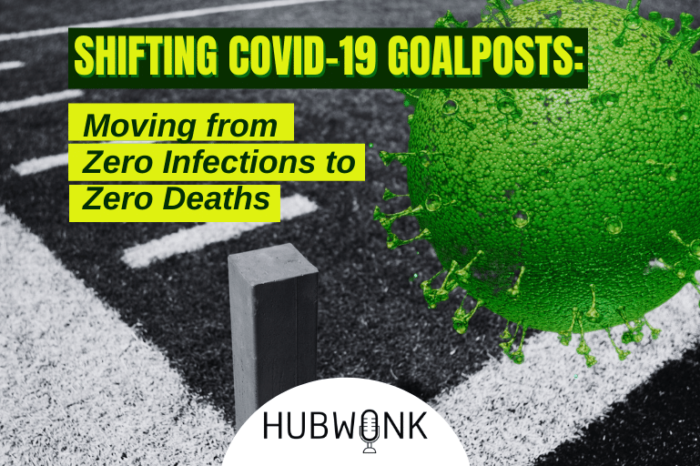Shifting COVID-19 Goalposts: Moving from Zero Infections to Zero Deaths
/in COVID Health, COVID Podcasts, Featured, Healthcare, Podcast Hubwonk, rCOVID /by Editorial StaffThis week on Hubwonk, host Joe Selvaggi talks with surgeon and author Dr. Marty Makary about the power and durability of vaccines, natural immunity and clinical therapies, that are overshadowed by the public health community’s continued target of zero COVID-19 infections.
Guest:
 Dr. Martin Makary is a New York Times bestselling author and Johns Hopkins physician. He writes for The Washington Post and The Wall Street Journal and is the recipient of the 2020 Business Book of the Year Award for The Price We Pay. A professor at the Johns Hopkins School of Medicine and Carey Business School, he has published over 250 scientific articles on the quality measurement, payment reform, and vulnerable populations. Dr. Makary has been elected to the National Academy of Medicine and is Editor-in-Chief of Medpage Today.
Dr. Martin Makary is a New York Times bestselling author and Johns Hopkins physician. He writes for The Washington Post and The Wall Street Journal and is the recipient of the 2020 Business Book of the Year Award for The Price We Pay. A professor at the Johns Hopkins School of Medicine and Carey Business School, he has published over 250 scientific articles on the quality measurement, payment reform, and vulnerable populations. Dr. Makary has been elected to the National Academy of Medicine and is Editor-in-Chief of Medpage Today.
Clinically, Dr. Makary is chief of the Johns Hopkins Center for Islet Transplant Surgery and is the recipient of the Nobility in Science Award from the National Pancreas Foundation. He has been a visiting professor at over 20 universities. Dr. Makary is currently the PI of several grants aimed at reducing low-value care and lowering health care costs. He was the lead author of the original publications on the surgery checklist and later served in leadership at the World Health Organization.
Get new episodes of Hubwonk in your inbox!
Read a Transcript of This Episode
Please excuse typos.
Joe Selvaggi:
I’m Joe Selvaggi.
Joe Selvaggi:
Welcome to Hubwonk, a podcast of Pioneer Institute, a think tank in Boston. Nearly two years into the COVID-19 outbreak, the disease is passing from a highly lethal pathogen rampant in an unprotected population to an endemic phase in which vaccines natural immunity and clinical therapies can effectively manage the perpetual risk of serious illness. But public health leaders have been slow to shift their stated goal of zero COVID infection to the achievable goal of zero COVID deaths. This attachment to an endless pandemic has overshadowed the profound benefits of vaccines, new therapies, and the durability of natural immunity. This reticence to adopt a zero death target in favor of eradication, also risks. The damage of undermining the public’s confidence in public health experts and institutions as vaccines and therapies bring us closer to zero COVID deaths. Will our public health officials be able to follow the science out of the pandemic, or will Americans need to discount their advice and find their own way back to normal?
Joe Selvaggi:
My guest today is Dr. Martin Makary, pancreatic surgeon, and professor at the Johns Hopkins University school of medicine. He is editor in chief of med page today and has published over 250 scientific articles on the redesign of healthcare, medical innovation, and health equity. He’s also author of the price we pay the 2020 business book of the year award. Dr. Makary will share with us his views on where we are in the COVID 19 vaccines and therapies. What’s the messaging of the public health community is missing in its current scientific and policy recommendations and what the potential costs to institutional trust could follow from continuing with the zero COVID strategy. When I return, I’ll be joined by author and surgeon, Dr. Marty Makary.
Joe Selvaggi:
Okay. We’re back. This is Hubwonk, I’m Joe Selvaggi, and I’m now joined by Johns Hopkins professor & editor in chief of MedPage today, New York Times bestselling author of “The Price We Pay,” Dr. Marty Makary. Welcome back to Hubwonk, Marty.
Dr. Marty Makary:
It’s good to be with you, Joe.
Joe Selvaggi:
All right. This is your third time as guest on the podcast. Welcome back. It’s great to have you in our last conversation. This was in let’s say, late spring, early summer. I would characterize a, and this is despite that the emergence of the Delta variant. I think you’re very optimistic that between vaccines and natural human immunity we have put this COVID-19 concern behind us by now. Well, what happened?
Dr. Marty Makary:
Well, I think we do have high levels of population immunity. We’re approaching the endemic stage where we’re going to see five to 20 cases per a hundred thousand in perpetuity forever, maybe for decades, at least. And so we’ve got to accept the endemic phase. If we keep testing everybody all the time, we’re going to see cases out there and that’s the endemic phase. Now we still are seeing areas where the outbreak is still occurring. It’s in the decline, but there are parts of the country we’ve just seen a bit of a bump in the great lakes area. And that’s, you know, we’re probably looking at the final burn through, at the virus, in that population. That’s just not immune through any form of immunity and they’re the ones who end up in the hospital.
Joe Selvaggi:
So there’s a lot to unpack there with would sound like a very simple summary of what’s going on. I think we would both agree that it’s perhaps the Delta variant that has been a game changer where we’ve gone from, let’s say almost taking a victory lap to accepting what you would, what seems to me, you’re looking for a long siege in perpetuity. What characteristics of the Delta variant has made it more contagious. And why do you think we’ve we’ve sort of changed our outlook so dramatically?
Dr. Marty Makary:
Well, first of all, I think you’re exactly right, Joe, that is Delta was such a game changer. We were doing really well. At the beginning of the summer, we were getting back to normal. We were feeling good about being in a good spot. Even when I had put out a projection that we would see a fair amount of population immunity by the end of the spring in 2021, I had said very clearly in that projection that we would see a bump in the fall that we would see this come seasonally and that this is going to be here for decades, but people didn’t really hear that. They just hear the kind of, when can I see some normalcy. And then there was this denialism that this is going to be a seasonal endemic virus. And people looked for really elimination or eradication expectations were not in line.
Dr. Marty Makary:
And then Delta also hit us. And it really was a game changer just by nature of its contagiousness. Now, remember when we say it’s twice as contagious, it’s twice as contagious as the U K strain B 1 1 7, which was already far more contagious than previous strain. So it really was a game changer and luckily immunity and vaccinations encompass that Delta strain. So you can feel good about immunity, but also, I don’t think people appreciated how much vaccine immunity was going to wane over time. That was something that many of us were concerned about and, you know, people were just told, Hey, you can get your vaccine you’re protected and you’re good to go. But the dosing interval, the spacing between those first two MRN eight doses was too short. And as a result, you didn’t really get the true booster effect, both doses functioned as a primer dose.
Dr. Marty Makary:
And to me, it’s still a shame to two big tragedies. As I look at our COVID policy. One is we still tell people to get their first two doses three weeks apart or four weeks apart. That’s, that’s not the best medical guidance, especially in kids. Now, most of the complications we see by the way are after that second dose, we, if you space them out, you not only get better immunity, that’s been well studied now, but you also get fewer complications. And the other tragedy is nobody should be dying of COVID right now with rare exceptions, we have enough therapeutics out there. Of course there’s backs vaccines to prevent it, but there’s separate from that therapeutics, which if you look at the totality of all the therapeutics out there, nobody really should be dying of COVID right now, if they get the right therapeutics.
Joe Selvaggi:
So we’ve had some obviously when we were first rolling out vaccines, it was best guess we didn’t know exactly the, the dose or the interval but we have the benefit of literally billions of people being vaccinated at this point. So you’re saying that we’re really not taking the science to its logical conclusion and spacing out those initial doses. Therefore I’m going to, my next question is the efficacy of those first initial two doses or in the case of J and J a single initial dose. Let’s talk, let’s start there. Where is the w let’s accept that the interval is too short, but what is the efficacy of those initial rounds of dosing? And then we’ll go on to the boost or effectiveness.
Dr. Marty Makary:
Yeah, I think it’s helpful to talk it in terms of numbers, because when people talk about boosters or getting the vaccine, they often like, let’s talk about, you know, the language we use for boosters, you have to, you must, you need, these are very crude over simplified terms. How about quantifying that risk? If you’re vaccinated, the risk of you getting an infection after your standard vaccination is one in 2000, and that is of getting a severe illness. One in 2000. Now that’s a risk tolerance that many people are okay with considering that, you know, it’s extremely rare for anyone to die of a breakthrough infection, unless they have a serious comorbid set of conditions by Colin Powell did, for example. So if you then get a booster, you’re reducing that risk of a severe illness from one in 2000 to about one in 20,000 ballpark. That’s an important quantification for people to know when they talk to their physicians about do, should I get a booster? It’s not as simple as you must need to have to. These are terms that I think we should abolish from our lexicon.
Joe Selvaggi:
I see just to put it in context I’ve had lively debates with friends and other people have challenged my, my views, if I have a one in 2000 chance of getting, I assume you mean infection or do, I mean severe sick, severe. Okay. At relative to let’s say something where a risk we’re more in year twos, let’s say something like seasonal flu, what are my odds of getting a seasonal? So I’m getting really sick from seasonal flu relative to COVID. Are they comparable numbers or is it an order of magnitude difference?
Dr. Marty Makary:
There are definitely comparable once you’re vaccinated. If so, if you are vaccinated, the risk of severe illness from a breakthrough infection is comparable to that of serious illness from influenza.
Joe Selvaggi:
I see. Okay. That’s important here. So now we’ve just talked about the efficacy of the vaccine, but as you mentioned in your initial introduction it does fade with time. We know there’s two ways to measure that that fading for our listeners, again, a rudimentary overview is we can either do randomly controlled trials, right. Or we can do observational studies and see who’s getting sick from both perspectives. What do we know about how these vaccines last over time?
Dr. Marty Makary:
Yeah. So generally with vaccines, the longer you space out the doses, the better the immune durability, there’s some magic number where at a certain spacing, you trigger that sort of artillery of your immune system of B and T cells. We’re not just talking about antibody surges, we’re talking about what we call cellular immunity. And that cellular immunity gets triggered at some magic number, like with MMR two doses with hepatitis B vaccine, it’s three with other vaccines, there’s a cup there’s very few, but there’s a few where you ha you get one dose and you get adequate immunity. So we don’t know what the magic number is for COVID-19. We think it’s functionally to recognizing that the standard dosing we recommended where people get the first two doses close together, it really functioned as one primer dose. So it may just be that when you get that second, when you get your booster six months or a year down the road, that gets you over the line in terms of long-term durability of that immunity, we’ll see, we’ll see what the data shows, but that’s the thinking right now,
Joe Selvaggi:
So that we mentioned that you had said in our earlier podcast that you used faced your own vaccine six months apart, these boosters I’ll admit I’ve had my Pfizer booster, which was almost to the day, six months after the second booster given you’ve got to the proper interval if six months is indeed that that’s where we’re talking about. You have a one in 20,000 chance of getting a severe illness from COVID.
Dr. Marty Makary:
Yeah. One in 20,000, one in 30,000, based on that Israeli study, that’s your risk of severe illness now that you’re boosted. And so I think it was a good decision for you to get a booster. And I, and generally I do recommend it for folks that are, you know, are not perfectly young and healthy in that you know, under 34, 40 age group.
Joe Selvaggi:
You’re guessing my age group pretty well with them. I’m not under 35. Now there’s likely a debate over the relative immunity or safety or protection from natural immunity versus the vaccine. So I want to compare and contrast the two different, because you were very enthusiastic. You, I think it started that national media making for more protection than a vaccines. We’ve got a little more data behind it. In fact, I want to actually mention that just this week, I saw two very different studies on that very question. That’d be one from the CDC and one coming from Israel that came to the opposite conclusion and not even close. One said you know, immunity, vaccines are much more effective than the other said natural media was much more effective. Where do you come down?
Dr. Marty Makary:
Yeah. So the CDC has a history of putting out jury rigged studies that are really dishonest on natural immunity. They did it with in Kentucky. They looked at a narrow two month interval and said, oh, over those two months, if we look at those with vaccines and those with natural immunity, the vaccines were about twice as better. Well, it was a narrow two month interval in one state. You have data on 18 months in 50 states. Why are you just reporting two months in one state, you’re doing something called fishing, where you search the data for a result that you want to show. And then you go back and fish out the data that support that after you look at data from the entire country, the entire pandemic, and very dishonest, very dishonest, by the way, the risk of getting COVID in both the natural and vaccinated immunity group in that Kentucky study, the CDC did was less than 0.0 is less than 0.1%.
Dr. Marty Makary:
So extremely rare in both groups. And they didn’t even say, if anybody got sick, that that’s the dishonesty of the caliber of work the CDC is putting out right now. They also came out with that study. As you mentioned, just last week saying that, oh, guess what? Natural immunity is not as good as vaccinated immunity. Therefore, if you have, if you recovered from COVID, you still got to get the vaccine. Well, again, they surveyed people in the hospital. You cannot do population-based studies from simply surveying people in the hospital. The way to do it is to follow people who, by the way, they didn’t use the right comparison group. I just put this out on Twitter. If you go to aunt Marty Makary. And so the way to do it is to follow people. And you followed two different groups of people. And then you see what happens to them that was done in the largest study worldwide in Israel.
Dr. Marty Makary:
And guess what it showed natural immunity was 27 times more protective against symptomatic COVID than vaccinated immunity, public health officials hedge their bet, and they got this so wrong. They said that vaccinated immunity is long and durable and natural immunity is fleeting and unreliable. They got it backwards and they’re having trouble right now, exercising humility to acknowledge that. So they put out that they’ve put out these two sham studies, by the way, why are we learning everything from Israel? The CDC has 20 times the data and 50 times the funding. They will not put out the data that we need. They will not release the data on re-infection rates or infection rates after vaccines in a head-to-head comparison. Like, like we need, it’s very, very disappointing.
Joe Selvaggi:
So you know, I don’t want to scribe any motivation motives to the CDC, but it seems it’s a particularly in this day and age where we’re, we’re all having doubts of whether we question authorities and institutions. I think they want establish themselves as an authority on, on on science. What would motivate an organization like that to exaggerate relative to natural immunity, the benefits of vaccines, or I guess underestimate the value of, of natural immunity in this case.
Dr. Marty Makary:
So I will ascribe a motivation because you’re having a nice surprise. You’re going to say now that you, you know, you trash the CDC, you’re going to say something nice about them. And I am, it was with noble reasons why I think they’re being dishonest about natural immunity. And that is they’re worried that people are going to say, well, if natural immunity is better or at least as good, I’m going to run out into enemy line of fire without any artillery or Bulletproof fast, I’m just going to go out and get it. And that’s going to be better. They’re really worried about that. They’re really worried about that. Matter of fact, a lot of public health officials have even told me, stop talking about natural immunity, because people are going to go out there thinking they should just get that and it’s better. But I think we can be both honest with the science and encourage people not to be careless and to get vaccinated at the same time.
Dr. Marty Makary:
And the problem with ignoring natural immunity is that you disenfranchise third or more of the U S population. And they’re, they’re angry right now. And they see the dishonesty in this because we don’t see reinfection after people get COVID. We don’t see re-infection result in severe illness and death. Where are those cases? We, we don’t sit, we’ve been told for 19 months that they’re right around the corner, that natural immunity is going to disappear. And then you see this wave of people get reinfected with severe illness. We do see reinfection, but they’re rare. They’re less than 1% of the time. And many times it’s just colonized. It’s not even symptomatic. They’re very mob cases. We don’t see people get severe illness and die from REA infections with rare exceptions. And what does that tell you? It tells you natural immunity in the time that would spin around.
Dr. Marty Makary:
It’s durable. Now we can’t make any statements about five years, but we’ve had 20 months of natural immunity. So observationally people are smart enough to natural immunity appears to be lasting. And they also see this general denial. Well, what’s happening is you’ve got nurses who have circulating antibodies, who are smart enough to know, Hey, I’m immune – why immunize somebody who’s already immune. There are side effects to the vaccine. We’ve seen them. The younger you go when you get to boys age 15, 15 to 25, 1 in 7,000 develop myocarditis. And of those that develop mild carditis and a group of 136 boys who had myocardiac or children who had mild carditis, one person died. That was in the new England journal of medicine three weeks ago. So to brush it under the rug and say, well, vaccines are perfectly safe. No, they’re very safe.
Dr. Marty Makary:
And the benefits outweigh the risks, but those who have natural immunity, there’s no scientific argument. They need the vaccine and smart people know that. And so what we’re having is people walking off the job, we’re having 22 fire stations shut down in New York. We’re having flights get canceled and wait till I think it’s November 23rd and December six. You’re going to see flight shut down all over this country, because that’s the deadline for air traffic controllers and certain people in the aviation industry. What does that do to the, to health and, you know the supply what’s going on with the supply chain in the United States, by chain for medications. So police officers, you know, walking off the job, look at the vacancy rates. So we’ve got to look at public health from a broad standpoint, we can’t look at this myopic view of, you know, this goal of vaccinating, every human being. We may, we may not need everybody in the United States vaccinated. We need non-immune people vaccinated who are eligible specifically. Non-Immune adults. Those who have not had natural immunity, they’re the ones dying in the hospital right now at a very high clip. That’s where we need to be focused on all of our efforts.
Joe Selvaggi:
So to be clear, I don’t want anyone to take away from this conversation that we’re not pro-vaccine. We think that they’re effective, as you say, any vaccine, any intervention has trade-offs, but you’re saying, oh, going to the fact that national muni is as effective as vaccines, they ought to be treated, but effectively on the same level as someone who has a vaccine. But of course, if someone takes from this, that boy I’d rather have, or it’s more effective once having had the vaccine I’m going to go out and get it. That’s sort of realized the danger of, of getting COVID if you’re unvaccinated, right? You don’t. I mean, that’s, that’s, we don’t want to recommend our listeners go out and get infected as a better alternative to a vaccine. Given the choices of vaccine is the far greater benefit
Dr. Marty Makary:
That’s right. And that is the hazard of talking honestly, about the science on natural immunity. We want people to get vaccinated if they don’t have natural immunity, if you have natural immunity, by the way, a lot of doctors most I know will say, well, you know what? You can get one dose of the two doses, you know, as a kind of medium, since this is a little bit of uncharted territory, there is some suggestion that one dose after natural immunity spurred the, reduces your risk to every desk. That risk is already extremely low from the, from the data, but it could reduce it further. It’s unclear if those who, the type of person who goes out and gets an additional dose is also the type of person. That’s more careful. And that’s why we’re seeing lower infection rates slightly in the group that gets an additional dose.
Dr. Marty Makary:
But yes, we’re very, pro-vaccine, there is a modern day McCarthyism, right? If you suggest, Hey, there’s a, there’s a side effect here. We need to reconsider the interval in young boys, which I do believe, I don’t think any, any young boy or anyone from that matter should be getting two vaccines three weeks apart or four weeks apart. So if you do question things, there is sort of this modern day Salem witch trial of, oh my gosh. They’re an anti-vaxxer. I think we need to be more honest with the science that if we did. So I think we’d get more uptake.
Joe Selvaggi:
It seemed to me implied in your last answer that mandates are both unnecessary for those who are, have natural immunity, but maybe also counterproductive. I’m, I’m curious about this has your team of data scientists analyzed a population where by they’re encouraged to get vaccinated. And one that is mandated to get vaccinated. I think a lot of people hold up these mandates to saying, well, sure, they’re a draconian perhaps unnecessary, but you know, if we can even get one needle in one arm, it’s all worth it.
Dr. Marty Makary:
I have not seen a head to head comparison and, and the ones that have been done have so many other confounding variables, right? Because the areas without mandates are also the areas where there’s a different approach to COVID and there’s seasonality and all kinds of factors. So I really guard against people that say, well, New York did worse than, you know, Florida. Well, New York was also at a time when therapeutics were massively in matured. We didn’t know how to treat this thing. So I think that’s difficult, but I do think the data are clear to me that if you fully vaccinated, somebody with who already has circulating antibodies, you’re introducing unnecessary harm. By the way, that was the conclusion of the Cleveland clinic study that looked at people who were, who had natural immunity. These were health care workers who are around the infection early on from taking care of people and God bless them.
Dr. Marty Makary:
And they got the infection, they have natural immunity and they went out and got a vaccine on top of that. And what they found is that the addition of vaccine and people with natural many provided zero added benefits, zero. Now, other studies, like I said, I’ve suggested a slight added benefit. We are already talking about being in a great spot. If you truly recovered from COVID here’s the final point I would say is also some people have natural immunity because they had COVID, but they had no symptoms. The degree of antibodies you get from COVID are proportional to how sick you were. So if you had no symptoms, maybe that’s the group that we’d say, sure, go ahead and get fully vaccinated. If you truly had it, you had symptoms. You, your body mounted a response you’re otherwise healthy. And immunocompetent, that is if a healthy immune system, then there’s no scientific basis for adding that vaccine in a two dose regimen to somebody with natural immunity. And I think we’ve got to be more honest and flexible with the mandates, all of these problems. We’re experiencing police officers walk in off the street, firehouses, unmanned, we’ve got a supply chain crises, including crises of food and medications right now. It’s not getting, there’s no projection. It’s going to be getting any better. Anytime soon, all of these were avoidable nurses walking off the job, all of these were avoidable. Would they slightly more flexible vaccine mandate policy that accounted for natural immunity?
Joe Selvaggi:
So let me push back a little bit and say, okay, the core, you know, this is, this is America. We believe in freedom. But the core of his public health mandate is not that merely a, the vaccine protects the vaccinated, the person who’s getting the job, but wrap their head. It protects his, his community, his neighbors. So this is kind of a complex way of saying, is there a justification I would compare to, you know, the reason we were the seatbelt mandates happens, not merely to protect the person who’s driving with mandates it’s. If you hit someone and fly through the window and hit their car effectively, your, your seatbelt helps both you and the other person is a mandate justified by saying, again, this is in the unvaccinated and those without natural immunity, by saying, look, you must get a vaccine to protect me.
Dr. Marty Makary:
I think we agree that the more people that are immune the safer the health of the public, no doubt, a hundred percent. And our goal collectively should be to ask, how can we get the most people immune mandates aren’t necessarily doing that because what you have are some people who are hardened in their position, might’ve been open to it are now every coiled into this appearance that they see the heavy arm of government. And, you know, they don’t want to do it now because it’s me versus the government. So are we really increasing vaccination rates from what we otherwise might have achieved through strongly encouraging people to get vaccinated and other strategies? That’s unclear to me. You see people now, like in this hard, no category, that’s not good now for essential workers. I think immunity requirements are good. And I’ve been supportive of it wrote about it early in the wall in the Washington post. But again, I use the term immunity requirement, not vaccine requirement. The problem with an indiscriminate vaccination policy as we’ve been hearing from on high is that not every person needs a vaccine. People who have circulating antibodies are doing just fine and you Aliant, you lose credibility with the public. And then you come in with such a harsh position. It is hardening people against the idea of getting vaccinated when we need all non-immune eligible people to get vaccinated.
Joe Selvaggi:
Okay. I want to move from the vaccine to masks. I’m in Boston, you know, this town well, and we still have a mandate indoors in public buildings, public spaces,uwith the exception I suppose, of when you’re eating or drinking,uwe need to wear masks. Now. It seems that,ualmost everyone is accepted. It’s very hard to transmit COVID outdoors. So our masking seems to have gone away, but indoor masking still, those mandates still exist. What are your thoughts on the efficacy of, of mask wearing, given the reality of how their masks are worn, how they’re worn,uand w you know, how effective are they in and finish that off with if they are effective. Now, when w w when in the future, what’s the limiting principle? When would, what, what milestone would we have to pass whereby you wouldn’t recommend indoor for Massachusetts?
Dr. Marty Makary:
Well, some people would say wear the masks forever. Every child needs to wear them until they graduate from college or graduate school from kindergarten on. And I would just argue that we need to have some exit criteria. We’ve not been given those exit criteria, because right now we’re in this sort of denial that we’re entering the endemic phase of the, of the of the virus. So if you look back, Dr. Fauci had said, when we get to 10 to 20 cases per a hundred thousand, that we could be so-called quote, unquote, free and clear. And he was specifically talking. I was in an interview where they were asking them about schools. Well, most of the countries there right now, we have got to remove restrictions as aggressively as we put them into place when the time is right, or else we’re going to lose massive credibility.
Dr. Marty Makary:
The worst thing you can do in public health is tell people to do things that you know, they’re not going to do. And so most of the country is there right now. Now, Massachusetts, I would say, look, if you don’t have immunity you don’t want to be going to do an indoor public area without a mask. If you’re in a crowded space, you’re going to be at risk. And as a courtesy to those who may not have immunity in an indoor crowded area, I would wear a mask. If I felt like this is a solidly immune population that I’m with them, with people I know, or people I’m confident got vaccinated, I don’t have to wear a mask. You don’t, you know, a lot of us don’t like wearing masks in public. I have been wearing a mask my whole life as a surgeon, I’m fine with it in the operating room, but there’s something about losing the human connection, wearing it eight or 12 hours a day.
Dr. Marty Makary:
And what are we doing at this point? If you have not had if you don’t have immunity, an adult does not have immunity because of their own choice at their own risk. And at some point we’ve got to, I think, move on with life. We can’t have kids mat wearing masks for 20 years. You know, eight hours a day. There are downsides to masks and people are in denial of it, but there are some downsides, especially kids with disabilities. Massachusetts is moving to a good place. They’re in a viral season right now. They’re in a viral season, every winter. So right now, Massachusetts is statewide has about 10 deaths on average, as a daily death count from COVID-19. We need criteria to get back to normal. Is it 5, 2, 0, 1? If there’s one, do we go back and shut down society? I think what we lose track of with COVID policy in general, Joe, is that we can’t say, oh my gosh, there was a death here from COVID.
Dr. Marty Makary:
We’ve got to continue these restrictions. What we need to do is look at what are the deaths. COVID what are the deaths from suicide, substance abuse, hunger depression. I mean, there’s tremendous implications of what we do when we put restrictions on. And if you look at what’s happened during COVID, which people have done very well, they’ve done extremely well. If you’ve got a second home, you’ve got a lot of money. The stock market’s been good, you’ve been able to work from home, but it has been punishing for the poor. And I think most people forget that half of America has less than $400 of cash on hand and lives, paycheck to paycheck, especially those who have been talking about COVID on a national stage. They forget that if you have a small business, if you struggle, if you live paycheck to paycheck, if you have to commute to work, if you’ve got kids at home with no childcare, it’s been punishing. And I think we forget that when we say, oh, well, you know, let’s keep the schools closed last year. For example, one of the issues I was very passionate about talking about how we needed to have our public schools open.
Joe Selvaggi:
We’ve talked a lot about the marginal benefits of additional mask wearing, or, or do you measure the cost? A lot has been talked about what I would call excess deaths. We’ve measured, how many people died from COVID and then there’s this other number of called excess deaths that aren’t attributable to the actual COVID itself, but something else, is it those numbers that you’re talking about? Whereby if we, we remain in a perpetual state of panic that people either through mental health or, or neglect of other health issues, is it that, that you’re talking about the danger of a perpetual crisis?
Dr. Marty Makary:
Yeah, exactly. And excess stats is a crude overall measurement. But when you look at substance abuse stats up 20 to 30%, depending on the part of the country last year, we don’t even have good data on suicide. If you go to the CDC website on suicide, you’ll see it. The last time it’s been updated, it was 2019. I just tweeted that the CDC should reassign one of their 21,000 employees to update that. It’s pathetic. So we’ve not been talking about these issues that we need to talk about because they disproportionately affect the poor, you know, come to inner city Baltimore. And tell me, you’re just going to give a kid who barely was hanging in, in staying in school. Anyway, you’re going to give them an iPad. And Tom, they’re just going to learn remotely good luck. I mean, so what we’ve had is this myopic focus on viral transmission because that’s the mission everybody was put on and we’ve lost track of health of the health of communities. So I hope that we can think more in terms of the disparities and addressing these socio economic disparities in addition to good hygiene and good public health policy, because one of the silver linings of this pandemic will be that we will not be as careless about respiratory pathogens in the future. You know, hopefully it will no longer be acceptable to show up to work or school coughing and sneezing and slobbering right next to somebody with no masks on, hopefully we’ve adopted some good best practices.
Joe Selvaggi:
Well, that’s the great bit of advice I was going to ask you what we’ve learned from this pandemics that we can take to better prepare us for the next, I think you mentioned one, are there, are there others beyond staying? Okay, look in the future we’re going to take these airborne illnesses seriously. We’re not going to come to work or if we do we’ll, we’ll wear a mask. Are there other things that you think we we’ve learned that are actually productive?
Dr. Marty Makary:
I think that’s the big one. People are now aware, you know, Asia had been spooked by a couple epidemics and as a result, it’s been accepted in Asian culture for decades to wear a mask. If you either have any exposure, a risk to somebody recently, or have any symptoms or have a vulnerability, or you’re just concerned. And so if you’ve seen somebody wearing a mask in the grocery store five years ago, chances are they were Asian because that was an accepted best practice and part of the culture. So we’re, we’re getting there, we’re getting there. I would hope we could be less politicized and have less canceled culture. Medicine has turned into tribalism and we see this sort of completely distorted approach to science. There’s no, the science, the science shows that science is an evolving process and we all have to have the humility to recognize everybody has gotten major parts of COVID wrong.
Dr. Marty Makary:
Every single expert, every single expert has gotten major parts of COVID wrong. We need to have humility around a virus that has been fooling us. Nobody saw India as massive outbreak coming, and that surge spawning a new highly contagious variant, that would be a game changer in the United States and result in a lot more death. So I think we should learn about our regulatory process. Like I said, no one should be dying of COVID right now, set aside the controversies of hydroxy, chloroquine and ivermectin. I personally don’t think those medications have any activity against the virus, but look at the drugs that have randomized controlled data showing a clear cut benefit, Prozac or fluvoxamine has been on the shelf for decades, reduces death rates by 91% in a randomized controlled trial. Everybody who has COVID mild or moderate should be getting that in my opinion hypertonic nasal saline spray, reduced hospitalizations with COVID significantly it’s been used for other viruses.
Dr. Marty Makary:
No pharma executive becomes rich from that, but it’s a defective treatment, good RCT data behind it. Monoclonal antibodies in combination with steroid nebulizers, also good randomized controlled trial when people are not getting state-of-the-art COVID therapy out there right now. And if they did, we’d see a much lower burden on society, people say, what have we learned for future pandemics, by the way, I don’t even think we learned from between the spring and the fall. We forgot everything. You know, when we were warning everyone about the fall and then second where there is another pandemic that has taken hold, that will certainly be sweeping across the globe, but it’s not going to be in a surge. It is a slow growing pandemic, and that is anti-microbial resistance. We don’t talk about that. I just did a Ted talk on this topic. It will absolutely have a death toll that will increase that will be higher than what we’ve seen of.
Dr. Marty Makary:
COVID-19 we’ve got to start preparing for that. And there are things we can do with our food choices and grocery and shopping decisions. The way we treat antibiotics for mild illnesses for viral illnesses, we’ve got to stop using antibiotics. So we need to focus on public health in a way that’s less political, more inviting of different opinions. Restores the scientific process enables an open form of discussion. It does not allow a few people to make all the decisions, which is what we’ve had and why there’s been this sort of lack of a focus on these important therapeutics. Like fluvoxamine net steroids, nebulizers, hypertonic saline, spray, even Mona pure veer. The Merck’s new drug cut COVID deaths to zero zero in the phase three randomized control. No one who’s gotten that drug of COVID has ever died. And they only studied in people with risk factors of, of dying a covered amazing drug. Why is it not available on an expanded access protocol now like convalescent plasma was, it should be, nobody should be dying of COVID right now with rare exceptions, we need to reevaluate our reevaluate, our regulatory process, and also the scientific oligarchy that is whole held the keys to all of COVID policy throughout this whole time. That’s my humble opinion on this topic. And that’s why I write about it
Joe Selvaggi:
A great way to end the show. I don’t want to wrap up a whole show with a one sentence, but I’d say in the beginning you said zero COVID isn’t really realistic where it’s now endemic, but what you’re describing as far as therapies, we could be zero COVID death in the U S if we correct our message away from mandates for vaccines, more towards information about effective therapies.
Dr. Marty Makary:
Yeah. We, no one should be dying of COVID now with some rare exceptions, there’s some cases, unique medical conditions, but best practices are not being used across the board. And I think there’s been this under recognition of some of the therapeutics again, because some people also fear and I do meet these people out there and say, oh, I’m not going to get vaccinated because the therapies are so good. You know, they’ll rescue me. And we, we really need to number one, encourage vaccination in non-immune adults as our top priority. And then also be honest about the therapeutics.
Joe Selvaggi:
All right, this is a great way to end the show. Thank you very much for your time, Dr. Makary, you speak truth to power and we appreciate it. Our listeners. Appreciate it. Thank you very much for joining Hubwonk.
Dr. Marty Makary:
Great. Thanks, Joe. Good to be with you.
Joe Selvaggi:
This has been another episode of Hubwonk, a podcast of Pioneer Institute, a think tank in Boston. If you enjoy today’s show there are several ways to support us, it would be easier for you and better for us. If you subscribe to pub on your iTunes pod catcher, if you’d like to make it easier for others to find hub long, it would be helpful if you would offer a five-star rating or a favorable review, but we’re always grateful. If you want to share Hubwonk with friends, if you have ideas or comments or suggestions, either about today’s show or about future potential episode topics. You’re welcome to email hubwonk@pioneerinstitute.org. Please join me next week for a new episode of Hubwonk.
Recent Episodes:

Republicans at a Crossroads: Weighing the Boost and Baggage of the Trump Train
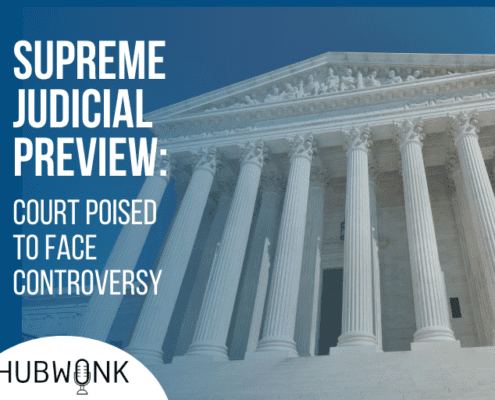
Supreme Judicial Preview: Court Poised To Face Controversy
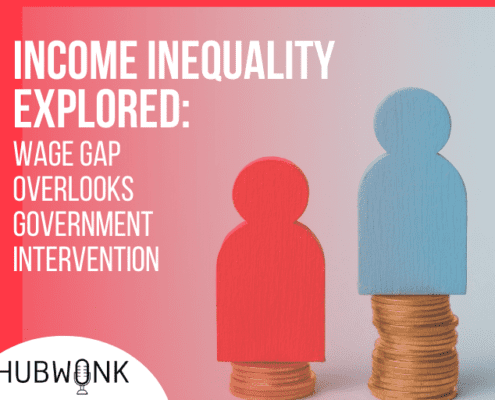
Income Inequality Explored: Wage Gap Overlooks Government Intervention
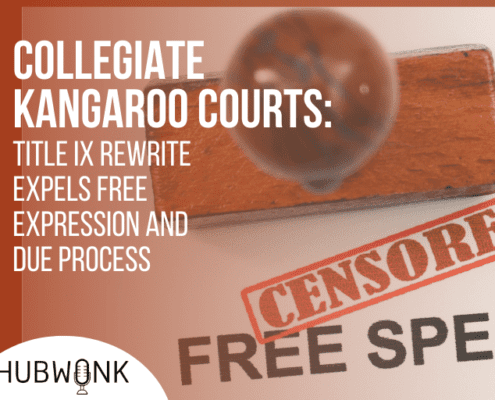
Collegiate Kangaroo Courts: Title IX Rewrite Expels Free Expression and Due Process
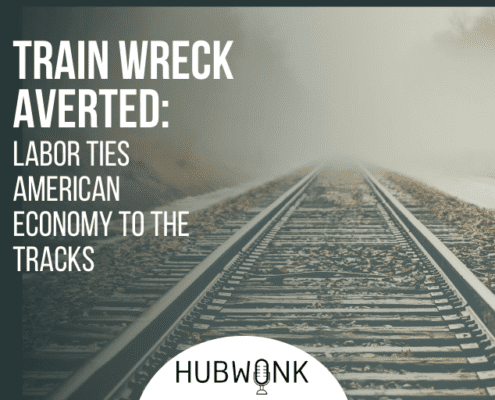
Train Wreck Averted: Labor Ties American Economy to the Tracks
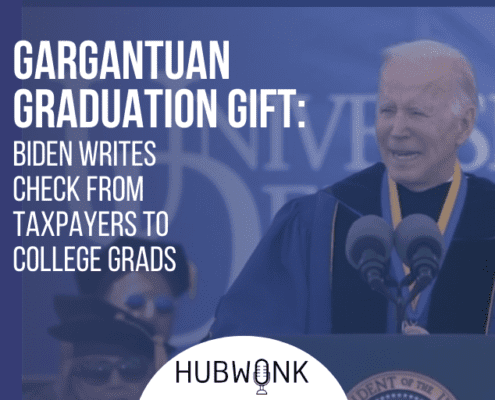
Gargantuan Graduation Gift: Biden Writes Check From Taxpayers To College Grads
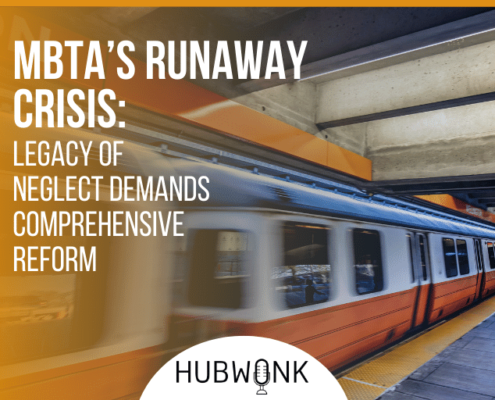
MBTA’s Runaway Crisis: Legacy of Neglect Demands Comprehensive Reform
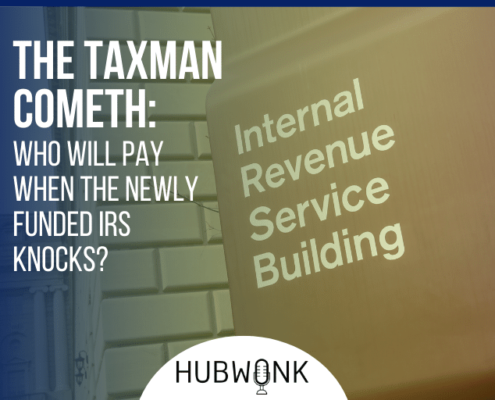
The Taxman Cometh: Who Will Pay When the Newly Funded IRS Knocks?
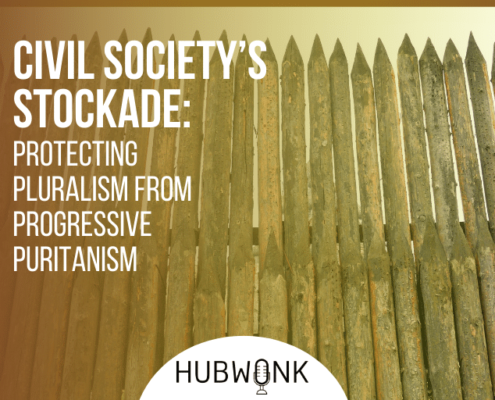
Civil Society’s Stockade: Protecting Pluralism From Progressive Puritanism
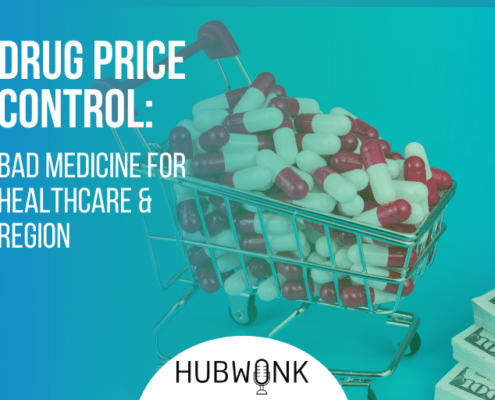
Drug Price Control: Bad Medicine for Healthcare and Region

